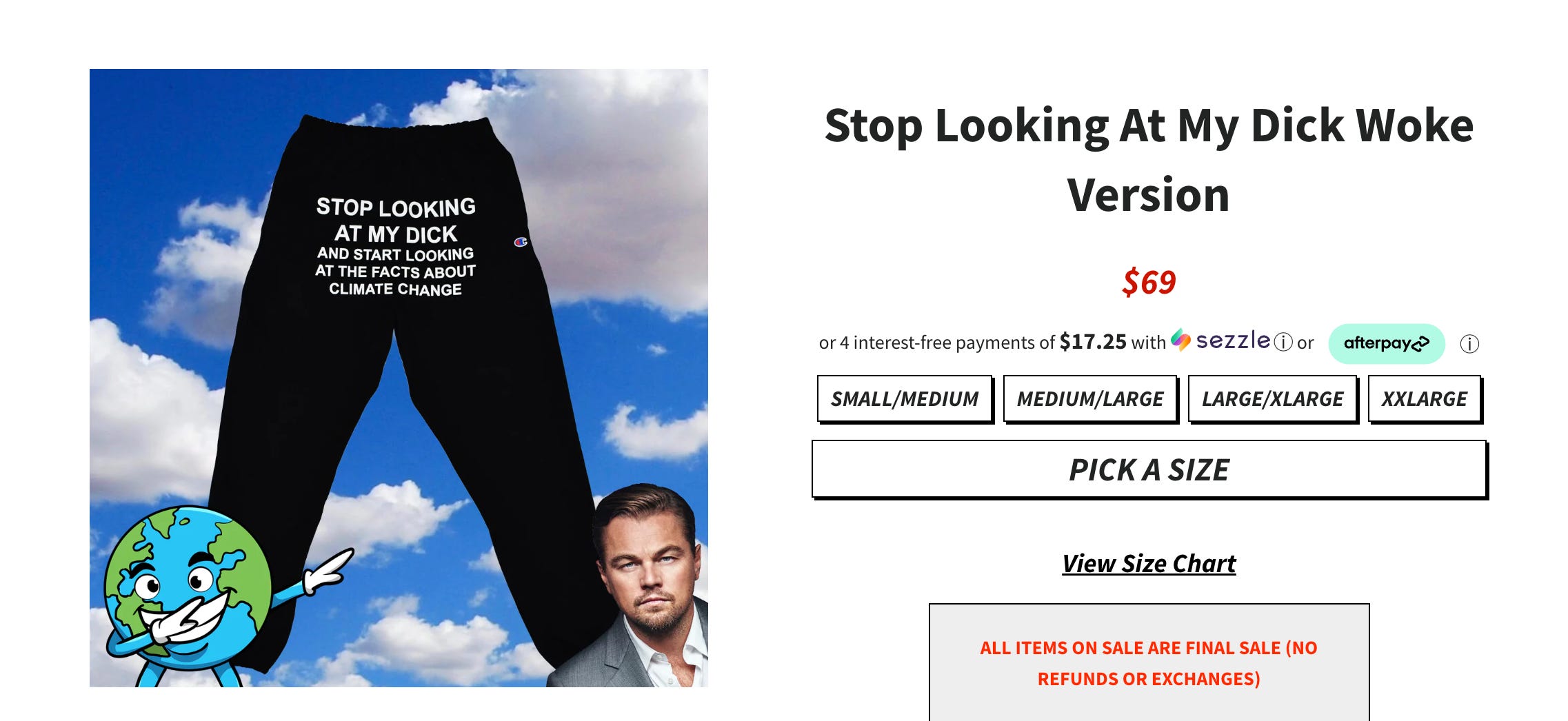This is the third part in a four part series called The Road to Consumer Nationalism. Part 1
2
3
.
Consumer Mentality - Deep Fried
As discussed in the last installment
of this series, affixing fake purpose to products is one way that consumer culture replicates itself—e.g. cigarettes as feminist “Torches of Freedom,” or today’s woke marketing takeover. However, after nearly a century of manipulative advertising, meaning has become decoupled from desire and is a less effective driver of sales. Consumers no longer need the Wizard of Oz to wear a mask; in wearing one he only reduces his power. Women no longer need a feminist reason to smoke. Radical gender theory doesn’t sell razors, and racialism doesn’t sell shoes.
Bernays redirected emotion away from community and civic duty towards products and corporations. This led to the transformation of the most basic human instinct, community formation, into a consumer exercise.
But if Bernays’ General Motors Parade of Progress, for example, supplanted community leaders with sellers, today’s culture completes the circuit by replacing consumers with citizens, who are all too eager to get naturalized. Amazon Prime is an example, as are AMC A-List, Costco Memberships, Nike Run Clubs, Coca-Cola Insider's Club Monthly Boxes—canaries in the coalmine for the new era of consumer nationalism. Sneakerheads sleep in camping chairs on Fairfax avenue for the latest Supreme drop. At Comic Con, Walking Dead fans wait for hours in blistering heat to interact with zombie actors for a few moments and receive a Walker Stalker pin. They relinquish time and money in exchange for access to a community, benefits, and symbols of devotion.
https://youtu.be/YrujdHGMFiw
The next phase is tokenization. adidas and Lacoste already frequent the top banner of OpenSea with exclusive metaverse clothing drops; NFTs with various rights and privileges in both the physical and digital worlds. Access to your “closet,” connect with other holders, and get priority access to future drops. ”Great utility!” they say—a phrase that refers to an NFT token’s benefits outside of the value of the token itself.
Why do people join these communities? They want the schwag of course, but there’s a deeper reason. They join them because they’re communities. A banner under which to exist. They’re not lining up for the shoes (or the money they can make re-selling them) as much as for the experience of gathering with like-minded consumer nationals. Before, corporations had to propagandize to recruit citizens—perhaps by waiving a rainbow flag. But, in what I term Deep Fried
culture, that’s no longer necessary. The brands that most interestingly demonstrate their purposelessness win. See e.g. the cynical Coinbase Super Bowl
ad (discussed in the last segment of this series), the most successful TV ad in decades.
To the last installment I received good questions about what exactly I’m suggesting. “Is it really that companies use woke marketing to attract “consumer nationals? If that’s what they’re doing, then why is woke marketing so ineffective and unpopular? If it’s a lure for citizenship, it’s not a very good one.”
This misunderstands my point. I’m not saying that woke marketing effectively recruits citizens, but that its ubiquity (despite its ineffectiveness) shows that corporations no longer care primarily about selling products—they’re more interested in taking over the world. Moreover, consumers want more from their corporate overlords than just BUYING stuff, as is so clear from the parasocial, borderline religious relationships they form with brands—see e.g. the lines at Comic Con or on Fairfax Avenue.

Note that it’s never woke marketing that causes this sort of brand devotion today. The reason woke marketing doesn’t work—and the silver lining of this paradigm shift—is that the Deep Fried consumer of today is no longer susceptible to what we call “propaganda.” After almost a century of being manipulated, they just don’t need it anymore; which is something Bernays couldn’t have predicted. Only the bloated corporations wasting billions a year on adult daycares—AKA “advertising/marketing agencies”—are still cranking out purpose marketing in the form of woke ads. Whereas the companies that succeed today have stopped lying entirely.
In the future, your membership in your corporate community (or state) will depend not on your purpose, but on your recognition of the importance of purpose in manipulating you. “Before I was a cool cat, I was a loser,” said one owner of a Cool Cat NFT at NFT.NYC
, NFTs themselves a Deep Fried recognition not of authenticity, but of the mechanism of authenticity itself.
Another example. People mistake peak Gen Z brand Pizza Slime
—the ultimate Deep Fried brand—as nihilistic. It sells pandemic-chic sweatpants plastered not with a nostalgic pizza logo (which would be PoMo), but every nostalgic pizza logo (Deep Fried).

Its best-selling items are sweatpants that say “Stop Looking at My Dick,” mocking Millennial Instagram culture wherein influencers post pictures of their hot bodies with captions about mindfulness or self-love, as if stripping for likes isn’t the shallowest possible thing to do. Its most recent version is a further tongue-in-cheek rejection of purpose-marketing, the “Stop Looking at My Dick Woke Version
,” sold for $69, which appends the statement with “…And start looking at the facts about climate change.”

For Pizza Slime, it appears, nothing matters—let’s just throw everything on a shirt and who cares if it looks like throw up. But this is a misinterpretation. What Pizza Slime does is more radical than modernism or post-modernism—it comments not on itself, but on how the sausage is made. If modernism interprets old things in a new way, and post-modernism is a collage of modernist interpretations, Deep Fried is that same collage copied 1000 times until it degrades, via generation loss, into a picture of the machine itself. It rips the mask off the Wizard—it’s only nihilistic insofar as it refuses to be manipulated. The Coinbase ad succeeded because it revealed Super Bowl ads for what they were—not meaningful pieces of art but glorified billboards that don’t need $10 million in “creative direction” to justify them. And so of course it triggered gynocrats
in the mainstream marketing world, who couldn’t help but attack Coinbase’s CEO after he proved he didn’t need them.
Tokenization means democracy and consumerism have melded into the same thing; what matters is the friends you made along the way. You would die for your fellow Walking Dead NFT
holders because they purchased a Walking Dead NFT, and you purchased a Walking Dead NFT so you could die for your fellow Walking Dead NFT holders. Budweiser’s 1936 NFTs included “Core Heritage” ($499) and “Gold Heritage” ($999) options. They were purchasable by credit card, so they weren’t really NFTs at all. It didn’t matter, they sold out in less than an hour. When they aren’t wasting money on woke marketing, pretty much every big brand—NFL teams, McDonald’s, Pepsi, 7-Eleven, Liquid Death Mountain Water—is following suit, each minting their own form of dubious crypto and selling it to “citizens” in exchange for rights, privileges, access, community. They don’t need to trick people into buying them. They don’t need to attach meaning.
Meaning no longer provokes consumption. Consumption invokes meaning.
Seller Mentality - The Remnant
Where propaganda is headed can be seen as depressing or liberating. People are willingly transforming into bugs, like bees or ants, who consume, signal, spread the message (as opposed to having the message spread to them). I find my part of the hive based on what I consume. I love my part of the hive because it’s my part of the hive. I love my hivemates because they’re my hivemates. I’m going to buzz about it all day long. Not a coincidence that E St. Elmo Lewis’ marketing funnel—a core principle of modern marketing developed in 1898—has recently been modified to add “advocacy” and “loyalty” after “conversion.”

We’ve seen how the consumer has changed. The question then is—what is the role of the queen bee? Or, in the human context, the controller of the things consumed?
I’m a perennial outsider
, but I’ve somehow worked inside the marketing world for a decade. Marketing insiders focus their attention on the psychology of people who buy stuff, which is fickle and unpredictable; the timeless mystery of all advertising. But, as an outsider, I’ve been more interested in the psychology of the people who sell stuff—e.g. my clients. And I can tell you: the people who sell stuff hate thinking of themselves as people who sell stuff. If today’s consumers are self-lovers, today’s sellers are self-haters. Ironically, today’s artists actually quite like imagining themselves as merchants, blacksmiths, shopkeepers humbly peddling their wares. But real merchants absolutely cannot bear that in another life they’d be nothing more than “smoked fish salesmen outside Minsk.”
They prefer to see themselves as natural leaders. And maybe that’s what they are. Global capitalism/democracy forces natural rulers to whittle down their vast, beautiful instincts into the shape of spam emails and powerpoint pitches. Caesars and Napoleons playing it as it lays.
As captains of society, they face a similar cognitive dissonance as I do; they are outsiders selling in. On the one hand, they have great contempt for buyers, which is why so many of them are willing to trick, swindle, cheat, and lie their way to wealth and fame. Why they believe their job is to clandestinely “propagandize,” as Bernays defined it. Of consumers, they think: “these people need herding, not emancipation!” But another voice reminds them constantly that great leaders speak the truth.
In 2017, I marketed for Curtis Yarvin. At least that’s what I was hired to do. His notorious Web3 project Urbit (with which he is no longer involved) had been marinating for almost a decade and was ready for more mainstream attention. The big questions were what is Urbit? And how do we explain Urbit to normies? Questions that still remain today (Urbit remains a client of mine).
Yarvin, as anyone who has spent time with him will testify, is not your typical comp sci nerd. He’s charismatic and fun to be around. Warm. Makes an effort to connect. He dances circles around you, of course, but for him coolness, likeableness, human connection—whatever you want to call it—is another intellectual challenge to master.
By the point I entered the fray, Yarvin had been identified by Politico as laying “the theoretical groundwork for Trumpism.” Allegedly providing the philosophical backbone to the movement, his “Unqualified Reservations” to “MAGA” as John Locke’s “Two Treatises on Government” was to George Washington’s “Appeal to Heaven” Pine Tree Flag.
But where Yarvin’s political ideas had escaped their container, Urbit had not. My mandate was to change that, but Yarvin himself struggled with whether or not that should change. Like many great leaders today, he struggled between wanting to propagate his message and the necessity of oversimplifying, lying, manipulating in order to do so. Yarvin hated marketing. It stunk. Even the word marketing—just so gross. Hence we arrived at The Remnant.
One of Yarvin’s favorite thinkers is Albert Jay Nock (for whom he named one of the functional languages of Urbit). Nock had addressed this very problem, taking a reactive stance to Bernays’ “…conscious and intelligent manipulation of the organized habits and opinions of the masses…”
Nock was a libertarian, a critic of the New Deal who wrote Our Enemy, the State in 1935. His first major work The Myth of a Guilty Nation was a giant redpill about World War I propaganda: Germany wasn’t, in truth, the monster portrayed in the posters. He became disgusted with the masses because of how easily they had been duped, so he “divided all mankind divided into two classes, the producers and the exploiters.”
He came to the conclusion that, due to their ineducability and susceptibility to emotional propaganda, the exploiters (consumers) were a lost cause. They could never be convinced to do the right thing. He defined The Remnant as the small minority of people who could understand the nature of state and society, and who could fix things, but only after the problems created by the masses and their masters got so bad that they couldn’t be hidden anymore.
Nock argued that The Remnant should give up on building bridges. Don’t try to manipulate exploiters into doing what’s best for them. Rather, it was The Remnant’s job to nurture relationships with itself, that top 5-10% of smart people who, once the dust cleared, could piece things back together.
For Yarvin, like so many dissidents, marketing, branding, advertising all represented lies and manipulation. Nock said no, don’t bother. Propaganda should be left to just the sort of sniveling bureaucrat that dissidents like Yarvin—or Trump for that matter
—want to destroy. The masses are never going to dance, so why invite them to the ball? Just strengthen ourselves while we wait for the propagandists to screw it all up.
It would appear the wait is over. In a way, the decoupling of ads and their products proves it; the buyers have become immune to sellers’ lies, and sellers, the successful ones, are pivoting in response. A new generation of less agreeable CEOs—including Elon Musk and Brian Robinson of Coinbase—eschew traditional marketing for something much closer to recruitment. Not “propaganda,” but “propagation.” They’re having the same realization Bezos with his full 180 on advertising
: yeah, “marketing” to “customers” is gay, but naturalizing citizens? Chef’s kiss.
This is the third part in a four part series called The Road to Consumer Nationalism. Part one is here
. Part two is here
. Part four will be published next week.
